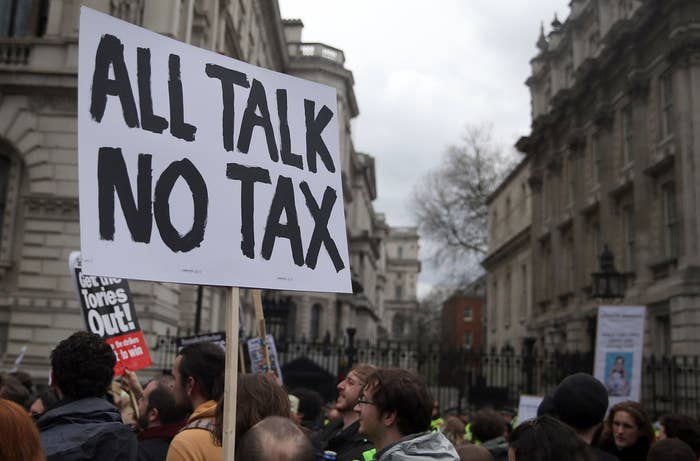
Tom Watson, the deputy leader of the Labour party, has demanded that the government back European Union proposals to crack down on tax havens, describing Britain's opposition so far as a "dereliction of duty".
On Tuesday, BuzzFeed News reported that the government was refusing to say whether it would now back plans – published by the European Commission in January and reiterated this week – to create a pan-EU blacklist of uncooperative tax jurisdictions. More than 24 hours later, the Treasury has yet to provide a definitive answer.
The proposals are backed by France and Germany, and follow the international furore over the Panama Papers leak and the prime minister's tax affairs.
"David Cameron has learned nothing from the events of the last week if he doesn't understand that the public want immediate and decisive action on tax avoidance and tax havens," Watson told BuzzFeed News. "The best way forward is to work closely with our EU partners, who have already taken steps to make the practice of hiding assets offshore a thing of the past.
"It is a dereliction of duty for the UK government to place obstacles in the path of the EU and the British public will not forgive David Cameron unless he acts now to reverse the government's position."
On Tuesday afternoon, the European Commission published new rules requiring large companies such as Google and Apple to disclose key tax and company information on a country-by-country basis. The commission also made clear that these rules are part of a broader strategy that includes the EU tax haven blacklist.
Until now, the UK has been strongly opposed to a blacklist proposal, a position the Treasury confirmed to BuzzFeed News as recently as Friday evening.
Earlier this week, French finance minister Michel Sapin called for the G20 to agree on the creation of a blacklist of non-cooperative tax jurisdictions. Sapin believes the EU should be the driving force in implementing a set of deterrent measures, and that enforcement should be mandatory in all 28 member states.
The UK has likened its position to that of Germany, as neither country has its own blacklist of tax havens.
However, a spokesperson for the German ministry of finance told BuzzFeed News that the country backed an EU-wide blacklist. “The German Federal Minister of Finance will present a proposition of several measures in reaction of the Panama Papers this week,” the spokesperson said. “One proposal will be the possible creation of a new ‘blacklist’, which should consolidate the different existing national and international blacklists on an international level. A first step would be the creation of such a list on the European level.”

The UK position so far has been that engagement and persuasion are much more effective than blacklisting.
A Treasury spokesperson said: “The UK has been at the forefront of international efforts to tackle aggressive tax planning, avoidance and evasion. As a result of our G8 presidency more than 90 countries, including Overseas Territories and the Crown Dependencies, have agreed to automatically exchange taxpayer financial account information. This will boost tax transparency and help HMRC crack down on tax evasion”.
The timing of the EU announcement comes at an awkward time for the British government, with the prime minister forced to admit after a week of damaging headlines that he benefited from an offshore investment fund set up by his late father.
On Monday, Cameron laid out Britain’s response to the Panama Papers in the House of Commons. He said the government has agreed a deal with all overseas territories and crown dependencies – except Guernsey and Anguilla – on them providing the UK with access to registers that set out the beneficial ownership of companies listed there. He also announced that the UK will bring forward plans to introduce a criminal offence for corporations who fail to stop their staff facilitating tax evasion, ahead of an anti-corruption summit Britain is hosting next month.
However, Cameron didn’t say whether the UK would back an EU blacklist of tax havens. In 2013, the prime minister personally intervened to try to prevent EU transparency rules affecting offshore tax trusts.
Plans to create an EU-wide list were first aired last summer. These were opposed by the UK and others.
BuzzFeed News has seen a note sent by the Treasury to the commission last June in which the UK government described the blacklist as deeply unhelpful and misleading, “since most countries and jurisdictions which are referred to are as transparent as EU Member States, and more transparent than some. In particular the UK’s Overseas Territories and Crown Dependencies have put themselves at the forefront of global tax transparency over the last couple of years."
The communication goes on to say the UK is “strongly opposed” to the suggestion that the commission might coordinate member state blacklists and a range of counter-measures.
The commission then went back to the drawing board and updated its proposals at the end of January. It suggested steps for the creation of a common list and an EU-wide approach to the listing of tax havens based on “clear and internationally justifiable” criteria to draw up such a list.
The commission believes these revisions addressed member states’ concerns. A spokesperson told BuzzFeed News the June list "simply gave an overview of all third countries that have been listed by any Member State. The overview was only intended as an interim solution during the development of a more robust EU approach. However, what last June's list has shown is that this common EU approach is urgently needed. That's why we proposed in January a process which we hope will lead to a pan-EU list of non-cooperative jurisdictions."
The proposed EU rules published on Tuesday reaffirmed the approach towards a common list presented in January. Criteria to compile the list could include indicators such as transparency around the exchange of information, fair tax competition, and meeting standards set by the G20 or the OECD.
If implemented, the list would be developed by the commission and member states, with the involvement of other European institutions. Under the plans, a final list would be compiled following a series of steps:
- the commission will identify the third countries that should be prioritised for screening using a scoreboard of indicators to assess the potential risk posed by third countries' systems on Member States' tax bases.
- Member States will decide which countries should be screened by the EU, based on the scoreboard results. The commission will engage in a dialogue with each third country being screened, to see how concerns can be addressed.
- based on the screening results, member states will decide whether to add a country to the common EU list and will set clear conditions for de-listing.
The commission, which expects this process to begin later this year, says it is aiming for a clear and coherent EU approach that replaces individual national lists.
